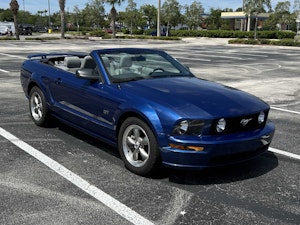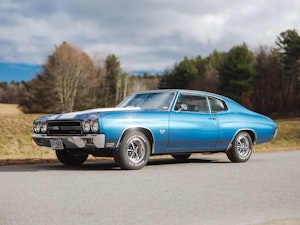Media | Articles
Why exactly did this 1971 Datsun 240Z command a record $310K?
No one here thought this 1971 Datsun 240Z on Bring a Trailer would pass $200K. With an hour left, the bid was sitting at $111,240 and we started tossing out final estimates around the office. Some joked about it selling for $240K, but none of us picked a final price higher than $170K.
Then, as the auction neared its final minutes, a bidding war broke out between two users (LightBlue and SJG109). The bid quickly rose to $240,000. Then $250,000… $270,000… $290,000… and finally settled on $310,000, the final bid from LightBlue—nearly double our high estimate. We were shocked. That’s a lot of scratch for a Z car of any stripe. How did we get here?
First, a little history.
The 240Z was an instant classic when it debuted in 1970. It was loved by the automotive press for being a modern, inexpensive sports car with impressive performance and was largely responsible for changing public perception of Japanese automakers—known at the time for their cheap econoboxes. With a $3500 base price (that’s a little more than $23,000 today), it was much less expensive than the competition; for comparison a base 1969 Camaro was around $3800 ($25K today). Dealers couldn’t keep 240Zs in showrooms. Demand was so high that the Kelly Blue Book value for a used 240Z was $500 over MSRP only one year after its release. It was common for dealers to buy a 240Z just to keep in their showroom so potential customers could see the car before they ordered one.
That’s exactly what James Munson, owner of Munson Datsun in Indiana, did when he bought the 1971 Datsun 240Z that wowed us on BaT. James specifically ordered a rare color combination, Racing Green over a brown vinyl interior, so that his 240Z would be different. The car remained in the dealership showroom until James gifted it to his son, Ronald, in 1984 as a dental school graduation present. The Z was then stored in the family home until its owner passed away in May 2019. In its 50 years of single-family ownership, the Z was only driven 21,750 miles. A complete chain of ownership, or even better, single-family ownership, helps verify authenticity and is very important for low mileage cars like this. That’s what makes this 240Z so special. On top of that, the car has had only one mechanic, Jim Mayo, from 1970–2019.
Marketplace
Buy and sell classics with confidence
Bring a Trailer is known for getting lofty prices for low-mileage cars, but this 240Z is more special than that—it’s likely the most original 240Z in existence.
It’s uncommon to see cars from this era in such sparkling condition. Virtually no one in the 1970s preserved cars in their wrapping like people in the modern era do with limited-edition Mustangs, hoping one day they’ll be collectible. But this 240Z was given the “future collectible” treatment since it was new. The interior is all original and barely worn. Protective plastic remains on the rear panels, seatbelts, and armrests. The key number sticker is still inside the glovebox door. An extra set of turbine-style wheels were ordered through the dealership and installed on the car, while the original factory wheels were powder-coated black by the Munsons and preserved in the family garage. Even the factory stickers in the engine bay look new. The paint is fully original and virtually flawless.
Time capsules like this bring out a lot of excitement from the community. There are currently 1400 comments about the sale on BaT’s listing, including over 60 debating the correct color of the screws on the door card and center console. The fact that Z enthusiasts are nitpicking this car on such a granular scale just shows how original it really is.
The 240Z has always had collector appeal. It’s one of those rare cars that is loved by everyone. We see Boomers, Gen X, and Millennials quote 240Zs evenly (32 percent, 27 percent, and 36 percent, respectively). The iconic status of the 240Z combined with the rare color, excellent survivor condition, and extensive history explains how it could sell for $310,000.
So how much is $310K?
To put this number in perspective, this car sold for five times greater than the Hagerty Price Guide value for a concours-condition 1971 240Z at $61,900. It even sold for $55,000 more than our Concours-condition value of ultra-rare 1971 Z432. Typically, when we see an early Z sell for more than $200,000 it’s one of the Fairlady Z432s. The 432 edition Zs were high-performance variants of the 240Z, using the S20 engine from the Skyline GT-R; 432 stood for “4 valves, 3 carburetors, and 2 camshafts.”
The highest sales for a standard 240Z rarely crest $120,000. A 1970 Datsun 240Z that was used as the basis for a Franklin Mint diecast model car sold for $124,240 in June 2019. Generally, even factory restorations don’t get much higher than $100K. One of the 37 240Z cars that Nissan bought and restored as part of the Vintage Restoration Program sold for $101,240 in July 2019. Then along came the Racing Green Z, which sold for three times that price because it was a true survivor in concours-level condition. I mentioned earlier that it is “likely” the most original 240Z in existence because we could now see other survivor Z’s come to auction soon. Big sales like this tend to bring cars out of the woodwork.

With this huge 240Z sale, 2020 is quickly becoming the year of the Z. Earlier this month, we saw a 1970 Nissan Fairlady Z432R sell for $805,700 in Tokyo. This destroyed our previous record for a 240Z, which was set in 2015 at Amelia Island when a 1970 Nissan Fairlady Z432 sold for $253,000. A couple hundred grand for these special-edition Zs isn’t unreasonable when you consider how few were made—Nissan produced only 420 Z432’s and 30–50 Z432R’s. Splitting the difference at $310,000, this 1971 240Z continues the trend of Japanese cars selling for serious values—like we’ve seen with the Acura Integra Type R and Toyota Supra MkIV in the past year.
Since 2017, values for Datsun 240Zs in #1 condition have increased 21 percent. This week’s sale could be a sign that the Z will continue to climb the ladder.









20200129194414)
20200129194344)
20200129194400)
20200129194441)
20200129194458)
20200129194527)
20200129194545)
20200129194605)
20200129194632)
20200129194648)
20200129194704)
20200129194731)


My 240Z is more original than this one.